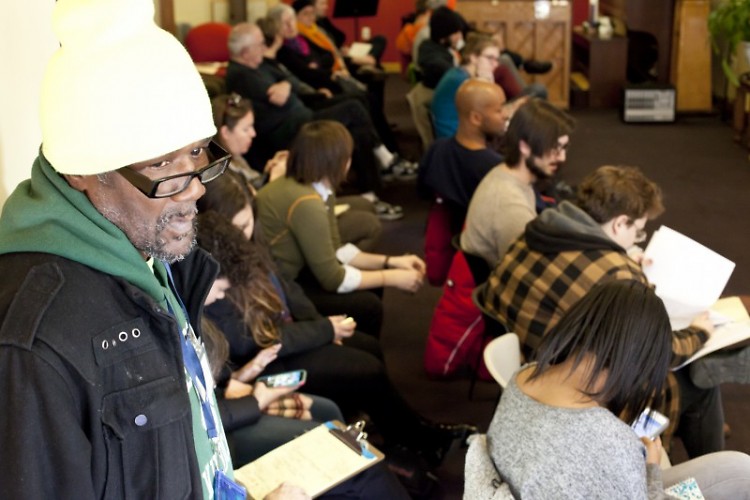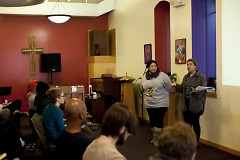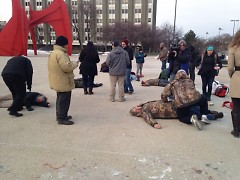Black Lives Matter: Grand Rapids held an introductory workshop at Heartside Ministries on police brutality and nonviolence, led by Anita Moore and Briana Urena-Ravelo. The organization also sponsored a protest at Calder Plaza in memory of Eric Garner, the man killed by a police chokehold on Staten Island, and other men and women of color who have died in interactions with police.
The meeting began with the discussion over the meaning of the word violence and what constitutes violent actions. A clip was shown of Civil Rights activist Angela Davis speaking on what violence and nonviolence meant to her community in Birmingham, Alabama in the wake of the church bombings. Urena-Ravelo spoke about how people often condemn those who riot and loot but fail to condemn the government for state violence against i's people.
"People not having access to food is violence. Systems that creates suffering and pain are violence,” says Urena-Ravelo. “The existence of the prison-industrial complex, repeated imprisonment, lack of rehabilitation resources, criminal records leading to a lack of job, housing and access opportunities create broken communities and homes. This leads to crimes against the state and a cycle of violence. A result of this is that we don't see individuals as being people, but as violators of property."
Moore and Urena-Ravelo encouraged attendees to not sit and watch because silence makes people complicit in the status quo.
"People are paying attention now but the stories are common," says Urena-Ravelo. "The more marginalized the community, the more this is true."
After discussing what constitutes violence and the differences between state sanctioned and individual violence, Moore and Urena-Ravelo directed the conversation to a discussion of what nonviolence is. The two leaders proposed that nonviolence is working for real justice that leads to peace, not a hollow peace that is merely a lack of unrest or quiet.
"Nonviolence can be very abrasive, rude, unapologetic, and disruptive," says Urena-Ravelo. "Nonviolence also acknowledges that people are not enemies, requires compassion towards the truth of violence in culture, and actively takes a stand against violence."
A full presentation of the workshop can be found on the Prezi, available online.
While Moore and Urena-Ravelo lead the workshop, it also included large amounts of crowd interaction and discussion. Several African-American people spoke up to share their stories of police harassment or times when the police ignored their calls for help. A white woman also spoke of her own attitudes toward what was happening being changed by her daughter who was in turn educated by people championing Black Lives Matter online. These stories worked to bring the informational workshop into acommunity discussion as people wrestled with the issues and sought to find ways to come together and make progress in the Grand Rapids community.
For her part, Urena-Ravelo said that she would rather spend her time taking positive action by building community groups than fight a system she views as flawed from the outset.
"We need community and independent answers, not state violence," she says. "The solutions are right here within us, not in the violence of the police system. How do we take care of each other? How do we look out for each other? What resources do we have outside of this initial anger to move forward?"
Black Lives Matter: Grand Rapids is hosting a second workshop next week, on Thursday December 11, again at Heartside Ministries, discussing Civil Rights leader Martin Luther King Jr. There will also be another to-be-announced action following this workshop.
Black Lives Matter: Grand Rapids is the local chapter of the national organization Black Lives Matter. The Grand Rapids' local branch was started by Moore and Urena-Ravelo in October in response to being unable to attend the National Weekend of Resistance in Ferguson, Missouri. Patrisse Cullors, co-founder of the national Black Lives Matter organization, encouraged them to start a group right here in Grand Rapids, "to show support and solidarity with Ferguson."
The local chapter is looking for volunteers and others interested in getting involved in their work. For more information, find Black Lives Matter: Grand Rapids on Facebook.
The Rapidian, a program of the 501(c)3 nonprofit Community Media Center, relies on the community’s support to help cover the cost of training reporters and publishing content.
We need your help.
If each of our readers and content creators who values this community platform help support its creation and maintenance, The Rapidian can continue to educate and facilitate a conversation around issues for years to come.
Please support The Rapidian and make a contribution today.


